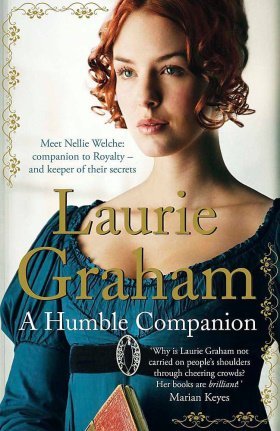I said, ‘Garth tells me Prince Ernie will be here tomorrow.
I thought he didn’t care for Weymouth?’
‘He’s coming for the sea-bathing,’ she said. ‘And Sofy will be so cheered to see him. He always makes such a pet of her.’
‘Then I think I’m not needed.’
‘Oh no, Nellie,’ she said. ‘You are most certainly needed.’
She said the other Royalties were not expected until the middle of August at the very earliest.
‘Then who has direction of Sofy’s care?’
‘I do,’ she said. ‘Well, I’ve nursed her since the day she was born. Dr Milman visits every day, and Garth keeps the Majesties informed as to how she gets on.’
‘Still, it would be better if Minny were here or Elizabeth. Sofy hates to be alone and I’m sure they have nothing to prevent them coming.’
But Mrs Che was like Garth. Her beloved Royalties were above criticism.
She said, ‘It’s not for the likes of us to decide what the Royal Highnesses may do. The Queen has need of them. Her nerves are still quite jangled, you know, since the affair at Drury Lane. It comforts her to keep them close.’
She meant the incident in which a gun had been fired at the King. It had happened some months earlier. His Majesty had just entered his box at the Theatre Royal when a deranged man fired a pistol from the pit. No harm was done, nothing damaged except a piece of gilded stucco, and the King had come out directly afterwards, quite composed, and showed himself to the people. But it appeared Her Majesty had decided to squeeze the drama to its last drop.
I said, ‘Well I think someone should come. I never saw Sofy so bad.’
‘They’ll come,’ she said, ‘when it’s convenient to them. And Dr Milman believes Sofy’s trouble will soon be resolved. I have every confidence in him.’
I was tired and aching from my journey and had no patience with her cipher face and bland assurances. I went to my bed while the sky was still light.
Next morning I read to Sofy from Robinson Crusoe. Dr Milman came at eleven o’clock, prescribed slippery elm and left immediately. I took a turn in the sunshine while Sofy slept. It was six years since I had been in Weymouth and I found it changed. A sea wall was being built and a great number of new houses, so the Esplanade was a muddle of dust and stone and shouting, sweating, labouring men. I called at Harvey’s Library and bought a copy of The Mysteries of Udolfo and by the time I returned to the house Ernie had arrived.
‘Nellie Buzzard!’ he said. ‘How very good you were to come.’
I’d never known him so civil. Ernie Cumberland, who had never given me the time of day, enquiring after my health and thanking me for my kindness to Sofy. I can only think the surprise of it knocked my wits out of me. I should have seen what game he was playing.
I said, ‘Have you been up to her? How do you find her?’
‘Quite well,’ he said. ‘Che tells me she’s much brighter today.’
I couldn’t see it myself. Only that she rallied enough to try the Kashmir shawl Ernie had brought her, and towards evening her breathing seemed to ease and her spasms subsided. We saw nothing of Ernie next day. He was dipped in the morning and then rode with Tom Garth to the Nine Stones at Winterbourne Abbas. But Sofy was contented, knowing he would look in on her after dinner.
She said, ‘Nellie, if I should die …’
I said, ‘You won’t die. You’ve gone a whole day without a crisis.’
‘But if I should,’ she said, ‘please cut off a lock of my hair, one each for my brothers and sisters. Royal’s will have to be sent. Then one for the King and Queen and one for yourself, if you’d like it.’
She’d have gone to her grave completely shorn by the time we got to the end of that list. I instructed her to live long instead and to think of leaving her bed the next day, to put on a day dress and take a little walk in the gardens of Gloucester Lodge, before she forgot what legs were for.
‘Not tomorrow,’ she said. ‘Soon, but not tomorrow.’
I was in a deep sleep when Mrs Che woke me.
‘Get up, Nellie,’ she whispered. ‘You’re needed most urgent.’
It was almost midnight. Extra candles had been brought to Sofy’s room. Dr Milman was there in his shirt sleeves, and an apothecary called Beevor. The bed was stripped down to one coarse sheet with Sofy stretched upon it in an old, mended chemise. An hour before the sun came up she was delivered of a baby boy.
I thought he was dead he was so blue and silent but I had never seen a child born before. Mrs Che rubbed him with a rag and he mewed, very softly and threw up his little arms.
She said, ‘Go to my room, Nellie. You’ll find a cloak on a hook behind the door. Put it on and look sharp.’
The baby was swaddled and Sofy was sleeping a laudanum sleep.
I said, ‘Where am I going?’
‘Garth knows what to do,’ she said. ‘Mr Beevor has gone to wake him.’
The house was quiet. Dr Milman lit me down the stairs and waited with me until the apothecary returned with Tom Garth. I stepped out into the dark street with Sofy’s son held tight in my arms and we walked north along the Esplanade in silence till he stopped suddenly and said, ‘Do I go too fast for you, Nellie? I was forgetting your arms are full.’
‘Tell me where we’re taking him.’
‘Not far,’ he said.
‘To be nursed?’
‘Yes.’
‘Or to be given up?’

























